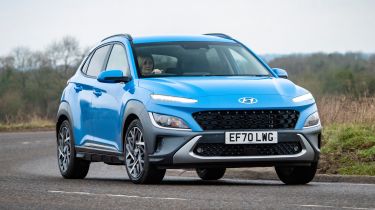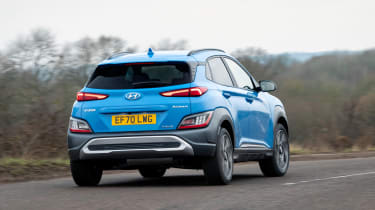Hyundai Kona SUV - Engines, drive & performance (2017-2023)
The Hyundai Kona is a competent but dull car to drive with no diesel option for higher-mileage drivers
The Kona follows a familiar formula in this part of the market, delivering average performance and safe handling that isn’t necessarily intended to engage or entertain the driver. The result is a competent car – it doesn't lean noticeably in corners and the steering has a decent sense of weight to it, but the Kona neither handles with the satisfying engagement a Ford Puma or soothes like a Citroen C3 Aircross.
The 1.0-litre petrol comes with a six-speed IMT manual gearbox, which is fine to use, and the car understeers in a predictable manner when pushed hard in corners, While the Kona displays decent body control, the trade-off used to be an overly firm ride. This has been improved for the facelifted Kona, which was tested by Hyundai’s engineers on UK roads before release. The suspension feels more composed and capable of absorbing poor road surfaces, even with 18-inch wheels fitted. However, the inert steering doesn’t enhance the overall driving experience.
Better news is that the Kona is fairly quiet at motorway speeds, which is good, because cruising and pootling around town are really what it was designed for; as long as you don’t expect too much more, you shouldn’t be too disappointed. Keen drivers will be better served by the range-topping Kona N, as it shares its powertrain with the Hyundai i30 N hot hatch.
Hyundai Kona petrol engines
The Hyundai Kona is only available with one petrol engine, and the 1.0-litre three-cylinder produces 118bhp and gets the Kona from 0-62mph in a rather sluggish 11.9 seconds.
More reviews
It does, however, have enough power for everyday situations, particularly around town, and is a pleasant engine to use. It doesn't get terribly loud, either, but isn't quite as powerful as the 1.2-litre petrol engine in the Citroen C3 Aircross, and although it matches the Mazda CX-3 for performance, it doesn't feel as eager.
The Kona was previously available with a 175bhp 1.6-litre petrol with a faster 0-62mph time of 7.9 seconds but this has been discontinued. In some markets this engine is being revamped to produce 195bhp in the facelifted car, making it significantly faster than the 1.0-litre Kona, but there aren't any plans to sell this version in the UK.
Hybrid motor
If you crave the efficiency of a diesel, the Kona Hybrid could be the ideal candidate. It pairs a 1.6-litre petrol engine with a 43bhp electric motor and a 1.56kWh battery pack, allowing for zero emissions driving at low speeds. It still feels a little sluggish, but the hybrid engine encourages a more relaxed drive anyway; we’ve reviewed the Kona Hybrid in greater depth separately.
Electric motor
The Hyundai Kona Electric is a pure electric SUV. It’s a lot quicker, with 0-62mph taking less than eight seconds, and the almost-silent powertrain improves refinement.
Driving carefully, 300 miles can be achieved from a full charge of the biggest 64kWh battery. There is a cheaper 39kWh battery offered, but you do get slightly less miles from this option with a 200-mile range.










